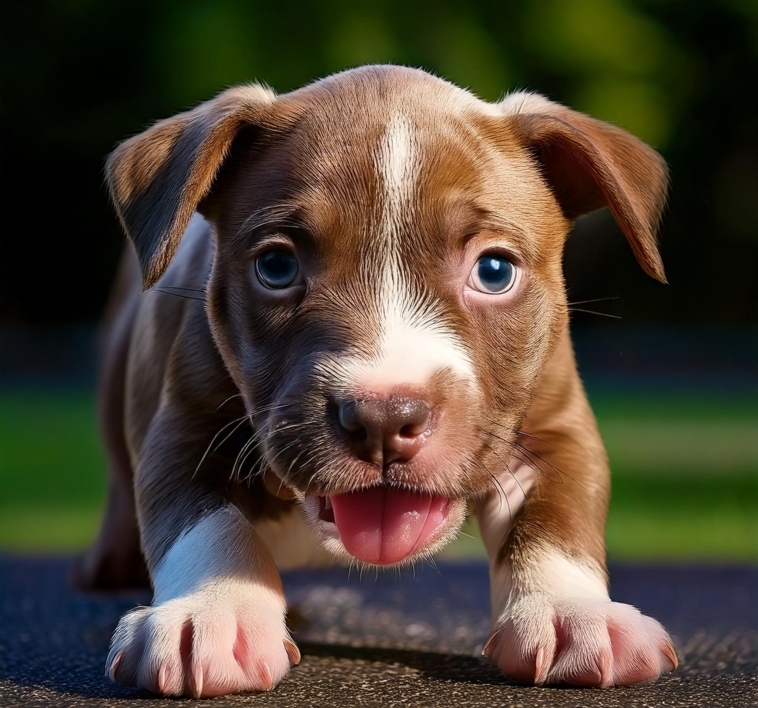Last updated on October 24th, 2024
Here’s an Overview:
Great Introduction to Pitbull Puppies for Beginners
Nutrition For Your Pitbull Puppy
Regular Veterinarian Appointments: These Cannot Be Skipped
Vaccination Schedule: To Safeguard Your Pets From Harm
Training Your Pitbull: Starting Early
Socialization Tips: Raising a Well-Mannered Puppy
Activity and Play: How to Exercise Pitbull Puppies
Pitbulls Other Diseases which can be avoided
Grooming Basics: How to Bath Your Puppy
Understanding the Behavioral and Non-Verbal Cues of Your Pitbull
UK’s Law About Dogs: Diet Restrictions: Foods to Avoid
Mental Stimulation: Activating Your Pup’s Brain
Conclusion: Long term Health and Happiness
Great Introduction to Pitbull Puppies for Beginners
Pitbull puppies are strong, highly agile dogs, and very loyal to their owners. But, it is important to grasp a few things relating to them to bring them up perfectly healthy.
Few Core Particulars About Them:
- Physique: Muscular, well built.
- Temperament: Full of energy, loving, and smart.
- Life Expectancy: About 12-14 years.
Main Points to Note:
- Training: Early socialization and proper training are very important.
- Nutrition: This type of dog needs a protein-rich and a well-balanced diet.
- Exercise: Can get quite bored if not exercised regularly and thus requires regular physical activities.
Some Health Conditions:
- Hip Dysplasia: This is a hereditary condition.
- Allergies: These can be due to some food or environmental conditions.
- Skin Diseases: They may suffer from mange and other skin disease conditions.
Taking care of these aspects helps avoid irresponsible dog ownership.
Nutrition For Your Pitbull Puppy
Pitbull puppy’s growth and development can be impacted greatly by feeding it the right nutrition. There are various factors to consider:
- Age and Growth Stage: Certain nutrients are required during certain growth stages.
- High-Quality Protein: This is crucial for the development of muscles.
- Balanced Fats: Important for energy as well as the health of skin.
- Vitamins and Minerals: It is safe to use supplements and winker so as to have a balanced diet.
- Fillers: Foods that contain fillers such as corn or soy, or any artificial ingredients should be avoided.
It’s advisable to consult a veterinarian for advice on what diet best suits an individual pet.
- Portion Control: Feed moderate quantities to avoid chances of weight gain.
- Hydration: Fresh water should be available all the time.
Regular Veterinarian Appointments: These Cannot Be Skipped
It is important to understand that regular visits to the vet are imperative in tracking the development and health of a Pitbull puppy. Thus, owners should try to have regular checkups so that the owner gets the essential vaccines on time and any forthcoming medical conditions could be recognized at the initial stages.
The following measures are associated with the majority of the visits to the veterinarian:
- Vaccinations: Making sure the puppy has received the essential vaccines.
- Parasite Prevention: Periodic examination for fleas, ticks, and worms.
- Growth Monitoring: Such as observing weight and physical development.
- Oral Signs: For assessment regarding early dental disease, examination of the teeth and the gums.
- Diet stands directives: This would include how much should be given in the diet for the purpose of health and growth.
These preventive measures can go a long way in improving the health of the Pitbull puppy in the long run.
Vaccination Schedule: To Safeguard Your Pets From Harm
A proper schedule of vaccinations will improve the effective health and well being of the Pitbull puppy. This requirement will enable a patent to know which vaccines are important for young puppies and at which age.
Core Vaccines:
- Canine Parvovirus vaccination
- Canine Distemper vaccination
- Canine Adenovirus vaccination
- Rabies vaccination
Recommended Schedule:
- 6-8 weeks: Vaccination against Distemper, Parvovirus
- 10-12 weeks: Second dose for Parvovirus, Adenovirus, Distemper
- 14-16 weeks: Second dose for Parvovirus, Rabies, Distemper
- Annual: Third dose of vaccination against core vaccines
Tips:
- Document all vaccinations that have been undertaken on the pet dog.
- Have a plan on when to take the pet for the clinic visit.
- Fully immunize the pet at the built vaccination distance to avoid chances of infection recurrence.
Training Your Pitbull: Starting Early
Beginning puppy training fosters a well-adjusted and friendly dog. There is no doubt that the best time to train a Pitbull is now. Employ positive reinforcement techniques to promote favorable behaviors.
- Basic Commands: Basic commands are sitting, staying, and coming.
- Socialization: Take your puppy to different people, places, and even animals.
- Consistency: Creates the need for a training regime.
- Crate Training: This would help with toilet training and provide dogs with a safe space.
- Leash Training: Necessary for walks and outings.
- Housebreaking: Set a schedule that will make your puppy loose control.
When done correctly, in this developmental phase, the puppy would turn into a successful creature later in life.
Socialization Tips: Raising a Well-Mannered Puppy
A gradual introduction of a Pitbull puppy to different events will yield shape wiener adults.
- Early Exposure: Any puppy should be exposed to a range of different sites, sounds and people.
- Positive Connections: When exposing the dog to new stimuli, reward it with praise and reinforcement through treats.
- Managed Playdates: The owners of the invited dogs should arrange a playdate while observing sanitary measures and unopened vaccination.
- Dominant Part Handling: Touch the puppy’s paw, ears, and mouth from time to time so that he gets used to it.
- Demeanor Education: It would help if the owner enrolled to learn obedience classes to avoid deviance and learn social prowess.
- Providing Time Themes: Provide permission leaders with appropriate times, locations, and cues.
Activity and Play: How to Exercise Pitbull Puppies
To assist in the proper growth and development of Pitbull puppies, they are supposed to have regular exercise and other physical activities. Having a balanced play and exercise schedule tends to prevent obesity and enhances their well-being.
- Taking them out for walks a few times a week: Flying at least two times per walk would do as to make sure the baby expends energy and gets to explore new environments.
- Give them Safe Toys: Safe, interactive toys such as puzzle toys, treat dispensing toys, etc.
- Practice Socializing: Hanging out with other vets will assist in improving acquaintance and friendly dog behavior.
- Training Days: Training days are best set aside for non-obedient dog owners to learn basic obedience.
- Fetching Games: Retrieval games are energetic, active, and help to boost the activity of a bulldog.
An active lifestyle is vital to maintaining the health of a Pitbull puppy.
Pitbulls Other Diseases which can be avoided
- Veterinarians Appointment: It is critical to make the animal return for regular check-ups in order to prevent undisclosed health conditions.
- Proper Diet and Nutrition: Make sure the diet consists of proteins, fats, and vitamins.
- Exercise: Provide at least one exercise a day so that they are within the required body weight and are fit and healthy.
- Vaccinations: Ensure that there are no overdue vaccinations to prevent normal diseases.
- Dental Care: Brush teeth and supply dental chews on regular basis to avoid oral diseases.
- Heartworm Prevention: Ensure that heartworm preventatives are given monthly as recommended by the veterinarian.
- Parasite Control: Apply flea and tick preventers to prevent breakouts and diseases.
Grooming Basics: How to Bath Your Puppy
Grooming your Pitbull puppy regularly is one of the actions that protect his or her health in the long run. It makes sure that the coat remains clean and devoid of debris. The appropriate grooming techniques involve the following activities:
- Brushing: Tangle the hairs with a soft bristle brush while brushing it and rub the skin.
- Bathe: The puppy can be bathed once a month with the use of mild dog mush that is available in the market.
- Nail Clipping: Nails can be nipped every three to four weeks to avoid excess growth.
Regular grooming encourages routine practices and activities that reinforcement a stronger relationship between the puppy and the owner.
Understanding the Behavioral and Non-Verbal Cues of Your Pitbull
Instead of guessing what is about to happen, it is advisable to read a Pitbull’s body language to ensure that their behaviors are kept in check. Important cues are:
- Ears: Uplifted ears indicate interest while those that droop are having a fear of something or someone.
- Tail: A wagging tail is generally a sign of glee while a drooping tail is probably a sign of fear.
- Posture: When all parts of the body that is the head neck, arms, torso are straight, it is a sign of confidence. And in contrast slouched body means submission.
- Eyes: Shallowing eyes could be, soft eyes are indicative of enjoyment or relaxation.
These cues bridge linguistic barriers between owners and dogs.
UK’s Law About Dogs: Diet Restrictions: Foods to Avoid
The health of Pitbull puppies is also significantly dependent on proper feeding. Some foods are harmful and should be avoided:
- Chocolate: Theobromine present in chocolate is toxic to dogs.
- Grapes and Raisins: These can induce acute renal failure.
- Onions and Garlic: Garlic sensitive red blood cells and can trigger anemia.
- Xylitol: This substance is present in sugar-free, and leads to insulin and consequently liver failure.
- Bones: His or her body is relatively weak, so bones can cause lethal internal Regions are very likely to cause torn and lethal internal damage.
Ensuring regular and careful surveillance of their diet, goes a long way enabling your effective control on the health of a Pitbull puppy.
Mental Stimulation: Activating Your Pup’s Brain
There are many positive sides of having a dog, but the main disadvantage is that one has to keep his puppy calm and interactive in the household. This is when their creativity comes into sight. They are a unique breed.
- Puzzle Toys: These engage their problem-solving ability through fun gameplay!
- Obedience Training: ‘Sit’, ‘Stay’, ‘Come’. These are all commands that train control.
- New Environments: Helps them see things in a whole new light and experience new sensations.
- Socialization: The more they interact with other breeds and humans, the less anxiety they experience.
- Hide and Seek: Plays with their drive to track down and locate which piques their interest.
- Treat-dispensing Toys: This can keep them occupied for hours while exercising their brain.
- Training Games: Toys like fetch or tug-of-war teach dogs endurance and proper training techniques.
- Learning Tricks: This activity also helps in keeping the dog’s brain sharp.
Dental Care for Your Pitbull
Dental care plays a key role in the general health status of a Pitbull puppy. Owners should start early so that they:
- Chews: Chews or dental bones should be provided to minimize tartar and plaque.
- Feeding: Well-balanced meals that have crunchy kibbles can help in maintaining clean teeth.
- Vet Check: Every pet should have a scheduled vet appointment and include dental checks in the schedule.
- Do some observations: Try to find some indicators of dental disease such as halitosis, gingival inflammation, presence of cysts, or even tooth loss and difficulty with mastication.
These measures are taken so as to avoid any severe health threats caused due to health neglect.
Conclusion: Long term Health and Happiness
On the other hand, achieving this hesitation free healthy and joyful lifestyle to a Pitbull puppy requires effort on a number of areas over time:
- Diet: Offer a variety of quality and blended foods that considers their age and their size.
- Exercise: This needs to be active in most days with some breaks in between
- Training and social interaction: Getting these pupils around other kinds of people, environments, and varying themselves.
- Veterinary care: Attending the vet for exams, vaccinations, and regular preventive measures against certain kinds of Pitbull diseases.
- Affection and focus: Eye contact, petting, and attention combined as a daily routine which helps the Pitbull keep up a steady and healthy bond to their owners.
Sticking to these protocols will result in a vibrant and happy Pitbull dog.
Written by: Dr. Ali Ahmad (Behavior Researcher)





